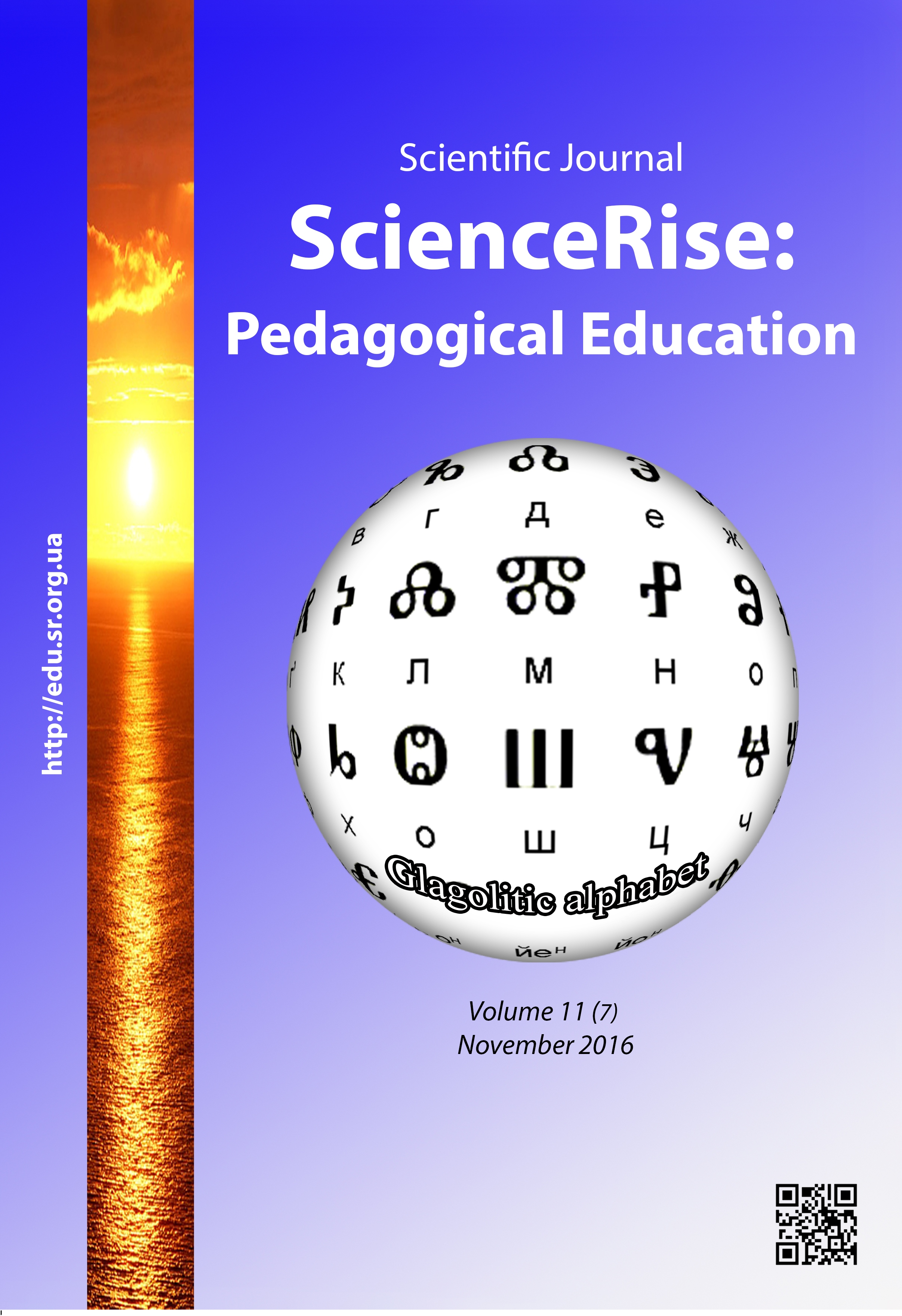The analysis of training technology as the method of competence development of future social and humanitarian sphere specialists
DOI:
https://doi.org/10.15587/2519-4984.2016.84689Keywords:
professional education, competence, students, development, learning training, training technologyAbstract
The problem of the raise of quality of training of future specialists of socio-humanitarian sphere under conditions of studying in higher educational institution that conditions the renewal of education content, realization of new approaches to the organization of study, that is introduction of innovative methods of the study, improvement of informational-resource support and so on were outlined in the article.
The essence and components of notion “competence of specialist” were explained as the totality of knowledge, abilities, settings, values, attitudes, features, qualities –node, educational and professional, - owned by the person and expressed in the different spheres of professional activity, in life situations that provides its competitiveness and personal and professional success.
The interpretation of the essence of notion “learning training” by the scientists was presented, especially, it was explained, that training is interpreted as the form of organization of the learning, learning technology, method of mastering of any complicated type of activity and the way of personal development. It was logically concluded, that just the planned and purposeful use of learning methods and techniques, exercises of training technology optimally favor the formation, development, improvement and widening of competence of the future specialists, because such learning is directed on the solution of real professional tasks in actual professional context and is directly connected with situations of their future use.
The practice of the use of the elements of training technology at practical and seminary activities in the study of future specialists of socio-humanitarian sphere in the process of mastering the discipline “Social work with different groups of clients” was elucidated.
The characteristics and possibilities of such organization of learning in the development of students’ competence were determinedReferences
- Ficula, M. M. (2006). Pedagogika vyshhoi' shkoly. Kyiv: Akademvydav, 352.
- Ratner, S. V., Skorikova, A. S. (2011). Voprosy povyshenija kachestva obrazovatel'nogo processa v VUZe. Innovacii v obrazovanii, 9, 34–45.
- Lazarev, V. S. (2010). O nacional'noj innovacionnoj sisteme v obrazovanii i zadachah nauchnogo obespechenija ee razvitija. Pedagogika, 7, 12–21.
- Olijnyk, V. V. (2015). Training of administrative elite in the formation of a new democratic governance model. ScienceRise, 9/5 (14), 4–12. doi: 10.15587/2313-8416.2015.50644
- Leont'eva, E. G., Timkina, K. V. (2014). Innovacionnye metody obuchenija kak sredstvo povyshenija konkurentosposobnosti vypusknikov vuzov. Innovacii v obrazovanii, 10, 75–80.
- Jermakov, I. G. (Ed.) (2005). Zhyttjeva kompetentnist' osobystosti: vid teorii' do praktyky. Zaporizhzhja: Centrion, 640.
- Kalashnikova, S. A. (2007). Navchannja doroslyh na osnovi kompetentnisno-orijentovanogo pidhodu. Kyiv: Proekt "Rivnyj dostup do jakisnoi' osvity v Ukrai'ni", 57.
- Hutorskoj, A. V. (2003). Kljuchevye kompetencii kak komponent lichnostno-orientirovannoj paradigmy obrazovanija. Nar. Obrazovanie, 2, 58–64.
- Petrovskaja, L. A. (1982). Teoreticheskie i metodicheskie problemy social'no-psihologicheskogo treninga. Moscow: Izd-vo MGU, 168.
- Emel'janov, Ju. N. (1985). Aktivnoe social'no-psihologicheskoe obuchenie. Leningrad: Izd. LGU, 166.
- Makshanov, S. I. (1992). Metodologicheskie aspekty professional'nogo treninga. Vestnik SPbGU, 3, 8–85.
- Vachkova, I. V. (2000). Psihologicheskie osnovy gruppovogo treninga. Psihotehniki. Moscow: Os'-89, 176.
- Leshchuk, N. O., Savych, Zh. V., Zaveryko, N. V. et. al. (2007). Metodyka osvity "rivnyy – rivnomu". Kyiv: Nash chas, 104.
- P"yatakova, H. P., Zayachkivs'ka, N. M. (2003). Suchasni pedahohichni tekhnolohiyi ta metodyka yikh zastosuvannya u vyshchiy shkoli. Lviv: Vydavnychyy tsentr LNU imeni Ivana Franka, 55.
- Selevko, H. K. (1998). Sovremennie obrazovatel'nie tekhnolohyy. Moscow: Narodnoe obrazovanye, 589.
Downloads
Published
How to Cite
Issue
Section
License
Copyright (c) 2016 Світлана Іванівна Мірошник

This work is licensed under a Creative Commons Attribution 4.0 International License.
Our journal abides by the Creative Commons CC BY copyright rights and permissions for open access journals.
Authors, who are published in this journal, agree to the following conditions:
1. The authors reserve the right to authorship of the work and pass the first publication right of this work to the journal under the terms of a Creative Commons CC BY, which allows others to freely distribute the published research with the obligatory reference to the authors of the original work and the first publication of the work in this journal.
2. The authors have the right to conclude separate supplement agreements that relate to non-exclusive work distribution in the form in which it has been published by the journal (for example, to upload the work to the online storage of the journal or publish it as part of a monograph), provided that the reference to the first publication of the work in this journal is included.







